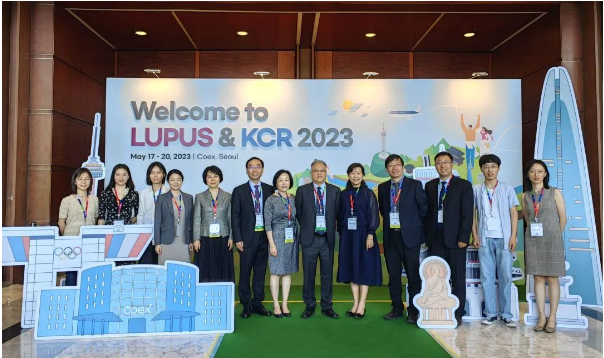Recently, the 15th International Congress on Systemic Lupus Erythematosus and the 43rd Korean College of Rheumatology Annual Scientific Meeting & 17th International Symposium (LUPUS & KCR 2023) were successfully held at the Coex Convention & Exhibition Center in Seoul, South Korea. Prof. Zeng Xiaofeng’s team from the Department of Rheumatology, PUMCH, on behalf of the Chinese SLE Treatment and Research group (CSTAR), presented at the “Chinese SLE Treatment and Research Group (CSTAR) Study Group Session”, and members of the team also made presentations and participated in exchanges at several other sessions. Together, they raised the profile of the Chinese academia at such a grand international event.

As the most challenging and fatal rheumatic autoimmune disease, systemic lupus erythematosus (SLE) has remained an object of research worldwide for years. In his opening presentation as the chair of the study group session, Prof. Zeng Xiaofeng briefed the audience about CSTAR, which is a leading clinical and research network originally formed in 2009 by 106 member hospitals in China, dedicated to developing new therapies and sharing knowledge and expertise to improve the diagnosis, treatment and management of SLE, thereby improving the survival of SLE patients in China and worldwide.
The other chair of the session was Prof. Li Mengtao, Director of the Department of Rheumatology, PUMCH. After the opening presentation, Prof. Tian Xinping made the presentation “15-year outcome of Chinese patients with SLE: Data from CSTAR”, providing valuable insights into the long-term prognosis of Chinese SLE patients. Prof. Zhao Jiuliang presented “2022 Chinese guideline for the management of pregnancy and reproduction in systemic lupus erythematosus”. The CSTAR session brought together many Chinese and international experts and scholars in different fields, who shared their cutting-edge knowledge and valuable experience in animated discussions.
Based on the National Clinical Research Center for Dermatologic and Immunologic Diseases (NCRC-DID), the Chinese Rheumatism Data Center (CRDC) and national databases, PUMCH has conducted several studies on the burden of rheumatic autoimmune diseases. In the epidemiology and public health section of the congress, Li Mucong, a student enrolled in 2016 into the 8-year medical education program of PUMCH, reported on behalf of her team the burden of death of nine rheumatic autoimmune diseases in China, as well as the incidence, prevalence and health economics data of SLE. Her presentation comprehensively demonstrated the current disease burden of rheumatic autoimmune diseases in China and provided an important reference for improving the integrated management model and health policies for such diseases in China.
Pulmonary arterial hypertension (PAH), a serious complication of SLE and an important cause of death, has always drawn widespread attention. In his presentation, Li Mengtao dived into the treatment strategy of SLE-PAH and promoted “treat-to-double targets”, a concept based on data of multiple cohort studies, which denotes reducing the risk stratification of PAH to “low-risk” and achieving remission of SLE through targeted therapy of PAH and intensive immunosuppressive therapy.
The congress was co-hosted by the Korean Society of Systemic Lupus Erythematosus Research (KSSR) and the Korean College of Rheumatology (KCR). Themed “Stairway to the End of the War”, the congress has a wide range of topics on its agenda, such as the annual review, pathogenesis, diagnosis and prognosis assessment, practical issues in treatment, and cutting-edge technologies. More than 2,000 basic research and clinical experts in the field of rheumatology from all over the world attended the event.
Written by and picture courtesy of the Department of Rheumatology
Translated by Liu Haiyan
Edited by Yan Xiaobo, Chen Xiao, Jiang Nan and Wang Yao
